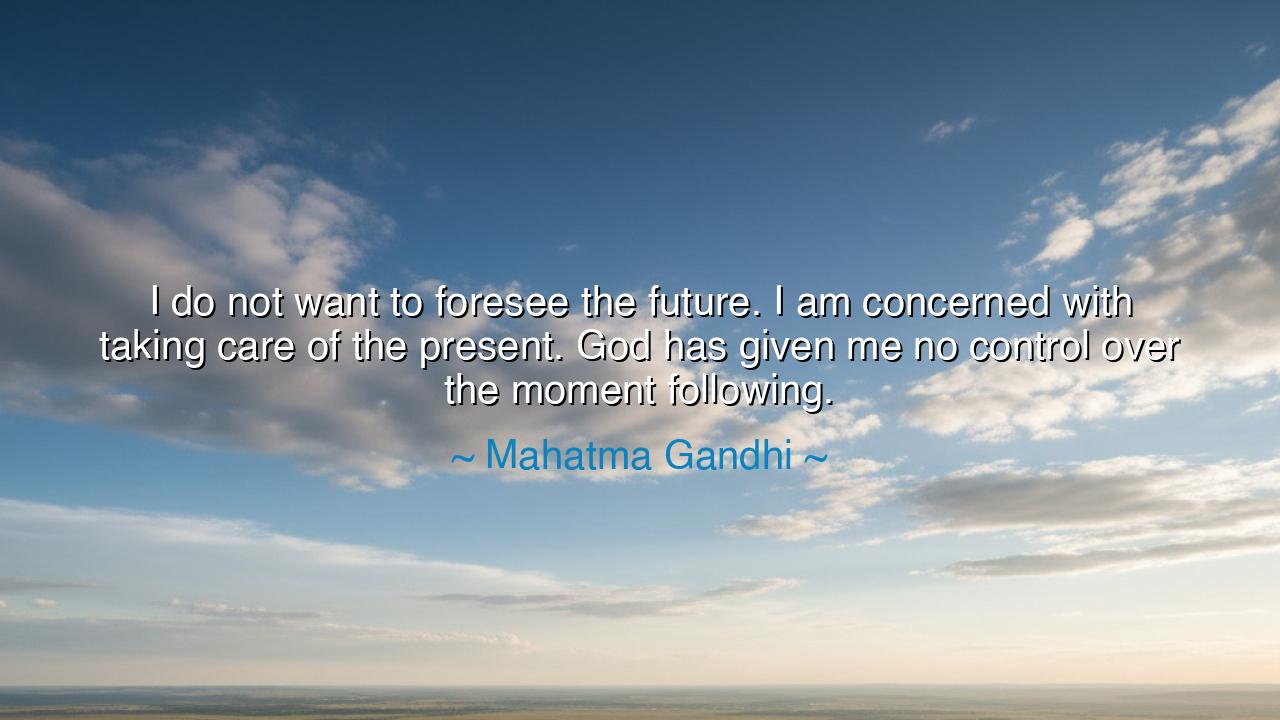
I do not want to foresee the future. I am concerned with taking
I do not want to foresee the future. I am concerned with taking care of the present. God has given me no control over the moment following.






"I do not want to foresee the future. I am concerned with taking care of the present. God has given me no control over the moment following." These words, spoken by the great Mahatma Gandhi, reveal a profound understanding of the human condition. In a world that often urges us to look ahead—to plan, to predict, to control—the wise Gandhi calls us back to the present moment. He reminds us that the future is beyond our control, and that true power lies not in trying to foresee what lies ahead, but in tending to the moment that is before us. His words echo the timeless wisdom of the ancients, who knew that living fully in the present is the only way to truly navigate the unfolding of life.
In the teachings of the Stoics, particularly Epictetus and Marcus Aurelius, we find similar sentiments expressed with great clarity. The Stoics taught that we should not concern ourselves with things outside our control. Our power, they believed, lies in our responses to the present moment—in how we meet the challenges of today rather than worrying about a distant future we cannot predict. Gandhi’s wisdom, much like that of the Stoics, invites us to release the anxiety of what may come and to invest our energy in the now.
Consider, too, the example of Alexander the Great, whose ambitions to conquer the known world were driven by a desire to control the future. Yet, even he, as he sat upon the banks of the Indus River, could not predict the end of his life or the untimely death that would come to him at a young age. The future, despite his mighty conquests, was a mystery he could not master. Like many others throughout history, Alexander's life reminds us of the fallacy of trying to control what lies beyond our grasp. Gandhi, in contrast, understood that the only life worth living is one lived in the present, for it is in the present that we find true purpose and peace.
The present moment is all we truly have. As Gandhi states, God has not granted us control over the moments to come. How often do we find ourselves consumed with worry about tomorrow, or longing for a future that has not yet arrived? Yet the present is where we can make the greatest impact. By focusing on the now, we cultivate a life of mindfulness, a life where each action, each breath, is imbued with meaning. The present is our canvas, and it is through the choices we make today that we shape the future—not through anxious predictions, but through deliberate, thoughtful actions.
The life of Mahatma Gandhi himself is a testament to the power of focusing on the present. In the face of overwhelming adversity—colonial rule, personal hardship, and the struggles of an entire nation—Gandhi did not allow himself to be paralyzed by the enormity of the future. Instead, he focused on the present and the small acts of nonviolent resistance that could shape the course of history. His success was not the result of grand predictions or attempts to foresee every obstacle, but rather in his steadfast commitment to each moment. His power came from his ability to act in the present, undistracted by the uncertainty of the future.
The lesson of Gandhi’s words is one of deep wisdom and humility. It calls us to embrace the present as our most valuable asset, to stop chasing after a future we cannot control, and to recognize that the present is where true transformation occurs. We cannot predict the future, but we can certainly influence it by how we live today. Our lives are not defined by the uncertainties of tomorrow but by the choices we make in the now. The future unfolds in the present, and in the present, we find the means to create the future we desire.
Practical Actions:
-
Practice mindfulness: Spend time each day focusing solely on the present moment. Engage fully in whatever you are doing, without distraction or concern for what lies ahead.
-
Let go of control: Acknowledge that you cannot control the future. Release the anxiety of trying to predict what will come and instead focus on what you can do today.
-
Take deliberate actions: Make decisions that align with your values and goals. Understand that your present actions shape your future.
-
Reflect daily: At the end of each day, take a moment to reflect on how you lived in the present. Celebrate your successes and learn from your challenges, knowing that tomorrow is a new opportunity.
-
Cultivate patience: Trust in the unfolding of life. Recognize that each moment is a gift, and that through the careful tending of today, a better future will come.






AAdministratorAdministrator
Welcome, honored guests. Please leave a comment, we will respond soon